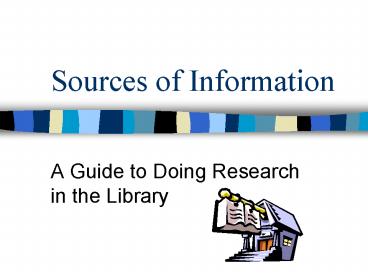Sources of Information - PowerPoint PPT Presentation
1 / 14
Title:
Sources of Information
Description:
Dictionaries. Encyclopedias. Atlases. Non-fiction books. Magazines. Online library catalogs ... Encyclopedias and dictionaries use 'guide words. ... – PowerPoint PPT presentation
Number of Views:61
Avg rating:3.0/5.0
Title: Sources of Information
1
Sources of Information
- A Guide to Doing Research in the Library
2
What is Research?
- Research is an organized search for the
information you need to answer questions about
your topic. - The questions you ask yourself about your topic
lead you to information.
3
Good Research Questions
- Where do I find out about it?
- Where do I start?
- Which references are very general to give the
big ideas? - Which references are too detailed for what I
want to know.
4
Good Research Questions
- What resources can I use besides books?
- How will I know what is important about the
topic. - How will I know who to organize these ideas?
5
Sources of Information
- Dictionaries
- Encyclopedias
- Atlases
- Non-fiction books
- Magazines
- Online library catalogs
- Internet resources
6
Dictionaries
- Alphabetical listing of words. Use to find
- Meaning of a word.
- Spelling of a word.
- Pronunciation of a word.
- Part of speech.
7
Encyclopedias
- A book or a series of books that contain
information on a great deal of topics. - Topics are arranged in alphabetical order.
- A good starting point for most research.
8
Using Guide Words
- Encyclopedias and dictionaries use guide words.
- These are words or a word at the top of each
page. - It tells you what the first and the last word on
that page will be.
- This makes it easier to find the information you
are seeking. - For example, car would be found between the
guide words call and cat.
9
Atlases
- An atlas is a book of maps.
- You can use it to find out about the geography
and the resources of a state or a country.
10
Non-Fiction Books
- Non-fiction books are books that contain true
facts. - They can be on any topic, or cover many different
topics. - They are often a good place to find detailed
information.
11
Magazines
- A publication that contains different pieces,
such as articles, stories or poems. - Magazines are published at regular intervals.
12
Online Library Catalogs
- A database of all of the materials that the
library owns. - You can search by keyword, title, author or
subject. - The Wynbrooke online library catalog will include
selected internet resources.
13
Internet Resources
- Wynbrookes Homepage
- http//www.dekalb.k12.ga.us/wynbrooke/
- Yahooligans
- http//www.yahooligans.com/
- KidsClick!
- http//sunsite.Berkeley.EDU/KidsClick!/
14
Wynbrooke Theme School
- Frank Rogers,
- Library Media Specialist































